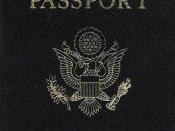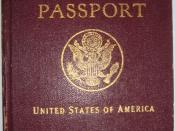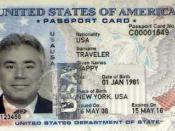Running head: PHASE 4 INDIVIDUAL PROJECT 1
12
Running head: PHASE 4 INDIVIDUAL PROJECT
Phase 4 Individual Project, Ethics in the Business Environment
Hope Green
Colorado Technical University
Professor Sweet
MGM365-1401B-01
Phase 4 Individual Project, Ethics in the Business Environment
Morals and Values
Good morals and values are things that we should have in regards to not only our personal life and the way we act and treat people, but also in regards to our business life and how we treat both coworkers and customers. Values are the actual beliefs that we live by in our lives such as do unto others as you would have done unto you. Morals are the values that we believe in that can usually be attributed to an external place of learning them such as one's religion or the society they live in. It is our morals that help us to determine the difference between right from wrong and choose to do the right thing (Career Education Corporation, 2010).
Code of Conduct Plan
Having a code of conduct plan in place for any business is crucial to its survival. If there is not a plan in place, some employees may not know how to act in certain situations and they may do something that could really hurt the business. Proper behavior cannot be expected unless leaders tell the population what they expect and how proper behavior is supposed to look (Editorial Board, 2012).
Doing Business Abroad
One thing to think about when doing business overseas is the U.S. Department of State. The U.S. Department of State is instrumental in issuing Apostilles and Certificates of Authentication. Depending on the country where the document is going to be issued is what determines which document will be needed. Some countries are not a part of the Hague Apostille Convention, for those countries, you would need an authentication certificate. If the country is a part of the Hague Apostille Convention, then Apostille Certificates are issued. The types of documents that require an authentic certificate are things like company bylaws, trademarks, extraditions, courier letters, and other documents. The Office of Authentications issues these certificates in accordance with 22 CFR, Part 131(Bureau Of Consular Affairs & U.S. Department Of State, n.d.).
Proper Documentation
Before travelling anywhere outside of the USA, there are certain papers and documentation that must be addressed. A current passport is one of the most important things that everyone will need who will be travelling outside of the USA. There are some host countries that require you to have a visa and sometimes you will also need a record of vaccination. If your business is going into another country to demonstrate a certain product, then an ATA carnet might be required, according to each individual country. You should contact the U.S. Council for International Business if you need to determine whether or not you will need this before bringing any objects for demonstration into another country. If you see that you do need an ATA Carnet, remember that it will take about six to eight weeks to apply for and receive it; they are good for one year.
Passports
All travel outside of the United States and Canada requires a valid United States passport. You may obtain one through some post offices, passport agencies, and also United States district courts. It usually takes about three weeks for a passport to be issued; after all proper documentation has been turned in. Some countries require you to also have a visa, this is why you must first check with the country you are planning on doing business in before actually going there. Visas are not given at the Passport Services office in the United States, instead you first have to have a passport and then when in that country, after showing certain documentation you are issued a visa. Only travel for business reasons requires one, travel for personal reasons such as tourists, do not need one (UNZ & Co., 1989).
Different Cultures
It is very important to first be aware of that country's different cultures before travelling there because you never know when you might be breaking the law or offending someone or their religion or their family. A great example is in Thailand; there the head is considered to be holy and revered, so you must not ever touch anyone's head there or even pass something over it. Some places like Kenya consider the number seven to be bad luck, but in the Czech Republic it is good luck. In Korea, the number ten means bad luck. The number four in Japan means death. In Bulgaria, yes and no are the opposites of what they are here in the United States. If you want to say no, you would nod your head, but if you want to say yes, you would shake your head from side to side. That is the perfect example of how something we do here is the exact opposite of what it means in another country. Please do not go to Brazil and use the hand motion for ok in the United States, which is a very common thing here, using your thumb and index finger. In Brazil it's meaning is very vulgar. There are too many differences to list them all here, this is for the people travelling abroad to look up on their own time, according to which country they will be visiting (UNZ & Co., 1989).
Ethical Code of Conduct for Employees, Vendors, and Board Members
The same ethical and moral responsibilities that this business faces, or that of any of its employees will be the exact same thing that is also expected of anyone else who has anything at all to do with this business. The bottom line is that we must act in such a way that leaves no room for questioning or suspicions to be lurking about wondering what we would do in certain situations. We have the responsibility to act in a way that starts a reputation of always acting in an ethical and moral that always upholds the law.
There are certain actions which will cause this company to immediately implement termination procedures and they are: not showing up for work, ignoring any manager or supervisor's recommendation or instructions, violating health and safety regulations, or wasting the company's time such as surfing the internet while on the clock (Apprenticeship's Info., n.d.).
Training and Implementation of Code of Conduct
Just as important as actually having a code of conduct for each and every business, is making sure that all employees are aware of the code of conduct plan on file for that particular business, as well as specifically what each and every person should do if they are involved in any type of incident where the code of conduct or possibly some labor laws might come into play. As more and more people start talking about this code of conduct plan and people start becoming familiar with its details, we will implement some kind of training program for all employees, board members, shareholders, and vendors. The training program shall consist of one person touching on the most important and main topics related to our conduct in the business arena, including when to involve the law and when to speak up or when to stay quiet. This training will include a strong emphasis on not breaking any labor laws. For example, depending on which state you live and work in, as well as whether or not you are employed by a private organization or a federally funded organization, there are certain whistleblower laws that are in place to protect people that have come forward to expose something that their company was doing illegally or unethical or whatever the case may be. For example, the following states are the only ones that have protection laws in place to protect "whistleblowers"-"California, Connecticut, Delaware, Florida, Hawaii, Louisiana, Maine, Michigan, Minnesota, Montana, New Hampshire, New Jersey, New York, North Carolina, Ohio, Oregon, Rhode Island, Tennessee, and Washington" (Avvo, Inc., 2014, para. 7). According to a recent KPMG survey regarding a code of conduct plan being on file or on display for their business, only 21% of businesses surveyed who had a code of conduct plan, also had some type of a training program related to it so that their employees knew how to interpret their plan as well as how and when to implement any legalities (International Labour Office, 2014).
Our policy is to also adhere to those same whistleblower laws so as to protect anyone who thinks that the business has acted unethical or illegal. Everyone should have the right to make decisions for their own actions and those actions should not be according to what your place of employment tells you to do or not do. If someone in this business instructs you to break the law or act unethical in any fashion, please immediately make note of the incident and bring it to the attention of a supervisor. This type of behavior will not be tolerated and is unacceptable.
Guidelines for following the EEOC & Civil Rights Laws
The EEOC stands for the Equal Employment Opportunity Commission; it was founded on July 2, 1965 by way of the Civil Rights Act of 1964, Title VII. It was formed to make sure that equal opportunity was given to each and every man and woman seeking employment. It was specifically created to fight against "discrimination on the basis of religion, race, sex, color, national origin, age, or disability" (Encyclopaedia Britannica, Inc., 2013, para. 1).
Employers must comply with the EEOC so as to not break any discrimination laws against any of its employees. The EEOC heads up investigations when claims have been made against a business that it discriminated against someone based on one of the above mentioned subjects. If intercession is not possible, the EEOC will then bring a lawsuit against the business that supposedly discriminated against the person. There are also approximately ninety agencies that are on or at the state level that work with the EEOC in regard to fair employment customs (Encyclopaedia Britannica, Inc., 2013).
Title VII of the Civil Rights Act of 1964 is the law that makes discrimination illegal. It is also illegal for the company accused of discrimination to retaliate against the person who claimed the accusation. Employers are also supposed to legally make a way for an employee to practice certain religious practices unless doing so would impose an unnecessary hardship on the operation of the business. The Equal Pay Act of 1963 is the law that is supposed to make it illegal to pay men and women different if the work is performed the same and in the same business (USA.GOV, n.d.). Although all of these laws do exist to protect people, it is sad that there are still many discrimination cases brought into court every year. In the federal courts alone, there are over 24,000 discrimination lawsuits on a yearly basis (Muellerr, n.d.).
Guidelines for following the ADA
Another law that must be upheld is not discriminating against someone based on the fact that they have a disability, whether it is a mental or physical one. The Americans with Disabilities Act (ADA) went into effect as United States law on July 26, 1990 and was signed by President George H.W. Bush (ADA.GOV, n.d.). It is not right or fair that someone with a disability be given different treatment because of that disability. As such, all of our facilities will be equipped with wheelchair ramps to accommodate any current or future employees who are disabled. They should have the same amount of respect as any employee. Discrimination against them will not be tolerated in this business.
Right and Wrong in the Workplace & Taking Legal Action
In order to always make the best decision in regards to dealing with when something is right and when it is wrong, the best thing to keep in mind is to always treat others as you would want to be treated in that same situation. If for example, an employee comes to you as a supervisor to tell you about a certain situation that has happened, first stop and put yourself in that person's shoes to determine the right course of action. The next thing to think about is whether or not legal action needs to be enforced. The best thing to do in all of these situations is to always get a second opinion of someone who is higher up than you are. If the law has been broken, including discrimination laws, then obviously the best thing would be to call the law. If the law has not been broken, then leave them out of it. Again, please always seek the counsel of a second party, specifically someone who has more authority than you do.
Unethical or Illegal Business Actions
The practice of actions that are considered to be unethical or illegal is a very simple subject to deal with. We will not tolerate it and that is final. If someone is doing something that is unethical or illegal, it should immediately be brought to my attention with no questions asked. No proof need be gathered, no witnesses or anything further, immediately stop whatever you are doing and let me know about it please. I will then take the appropriate actions depending on the severity of the unethical or illegal actions.
Ethical Responsibilities
This business has an ethical responsibility to follow all of the guidelines and laws that have been enforced by law enforcement of the United States of America. The individual who does unethical or illegal things in the name of this business will be immediately terminated. Whatever the employees do is how people thinks of this business and I will not have someone breaking the law and making my business look bad. You do not need an officer of the law to tell you that it is wrong to treat someone with disrespect just because they are in a wheelchair, or because they are black, or because they are white, your internal senses tell you this is wrong, but some of us choose to overlook that and do it anyway. Not in this business, it will not be allowed. It is a proven fact that companies who are ethical are much more profitable and it is far less stressful on the management as well as other employees when the business follows certain ethical guidelines (McGraw-Hill, n.d.).
Monopolies and Oligopolies
A free market has four different types of competitions; monopoly and oligopoly are two of them. When there is a monopoly, there is only one seller of a certain product, but because the government regulates their business, they cannot legally charge customers over a certain amount of money for that item. An example of a monopoly would be the company in your area that sells electricity to consumers. Where I live, there are only two suppliers of electricity but you do not have a decision which company to go with, it depends on where you live. One company offers electricity in only certain areas; likewise the other company offers electricity in the other areas. Because the government regulates these businesses, there are not many businesses that operate in this market. In an oligopoly, there are only a small amount of dealers of a certain product who sell a large percentage of products. They exercise some control over the price, however, because the products are much the same, if one business lowers or raises their prices, all of the other businesses in the area must follow. An example of this kind of business would be an airline company (Collins, 2013). It makes no difference whether the business is a monopoly or an oligopoly; they all have the same ethical responsibility to the consumer. That responsibility is to make sure that everyone's civil rights are followed and that everyone is respected the same.
Ethics in the Marketplace
Regardless of whether a company is a monopoly or an oligopoly should not matter; however there are certain things that some businesses do that are unethical. These things include price fixing and manipulation of supply. Price fixing is when two or more companies agree on a high price to artificially set for consumers. Manipulation of supply is when two or more companies agree on a set amount of product to sell that is less than the demand and therefore limits production (Velasquez, 2006).
References
ADA.GOV (n.d.). Information and Technical Assistance on the Americans with Disabilities Act. Retrieved March 23, 2014, from http://www.ada.gov/ada_intro.htm
Avvo, Inc. (2014). Employer Retaliation Against Whistleblowers. Retrieved March 22, 2014, from http://www.avvo.com/legal-guides/ugc/employer-retaliation-against-whistleblowers
Bureau Of Consular Affairs, U.S. Department Of State (n.d.). Legal Considerations. Retrieved March 20, 2014, from http://travel.state.gov/content/travel/english/legal-considerations/judicial/authentication-of-documents/office-of-authentications.html
Career Education Corporation (2010). FAQs: Business Ethics. Retrieved March 13, 2014, from http://coursebuildercontent.careeredonline.com/Assets/30000/26507.pdf
Collins, K. (2013). Exploring Business (1.0.1 ed.). Retrieved March 23, 2014, from http://catalog.flatworldknowledge.com/bookhub/reader/140?e=collins-ch01_s05#collins-chab
Editorial Board (2012). Introduction to Business Law (1st ed.). Retrieved March 20, 2014, from http://wow.coursesmart.com/9781934920626/id0002
Encyclopaedia Britannica, Inc. (2013). Equal Employment Opportunity Commission (EEOC). In Encyclopaedia Britannica. Retrieved March 23, 2014 from http://www.britannica.com/EBchecked/topic/190574/Equal-Employment-Opportunity-Commission-EEOC
International Labour Office (ILO) (2014). Bureau for Worker's Activities. Retrieved March 22, 2014, from http://actrav.itcilo.org/actrav-english/telearn/global/ilo/law/unconw.htm
McGraw-Hill (n.d.). Ethics and Corporate Responsibility. Retrieved March 23, 2014, from http://highered.mcgraw-hill.com/sites/dl/free/0070921989/226745/ferrell_sampleCH02.pdf
Muellerr (n.d.). The Economics of Discrimination. Retrieved March 23, 2014, from http://muellerr.people.cofc.edu/page4.html
UNZ, Co. (1989). Basic Guide to Exporting. Retrieved March 20, 2014, from http://www.unzco.com/basicguide/c14.html
USA.GOV (n.d.). U.S. Equal Employment Opportunity Commission. Retrieved March 23, 2014, from http://www.eeoc.gov/eeoc/
Velasquez, M. G. (2006). Business Ethics: Concepts and Cases (6th ed.). Upper Saddle River, N.J.: Pearson Prentice-Hall, Inc. Retrieved March 23, 2014, from http://www.prenhall.com/velasquez/


